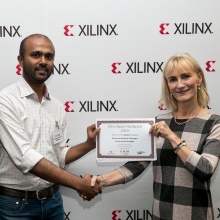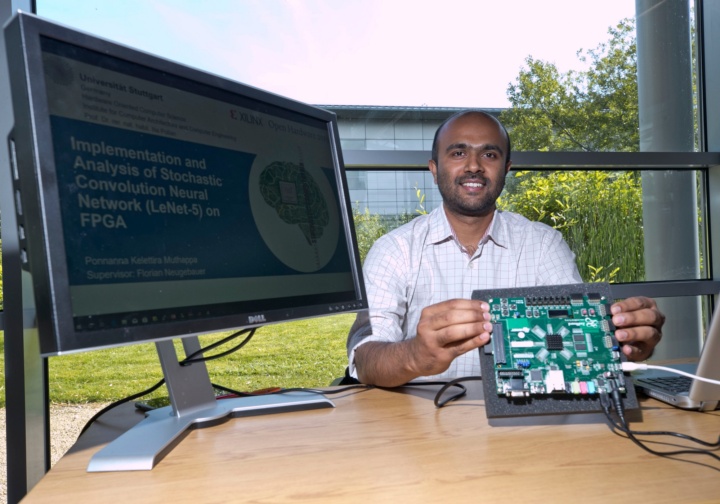Ponnanna Kelettira Muthappa, a student of the international Master’s program “Information Technology” (InfoTech) at the University of Stuttgart, has won the Xilinx Open Hardware Competition in the “Student” category. His winning entry, which was recognized at an awards ceremony at the Xilinx European headquarters in Dublin on 5 September 2019, contributes to ongoing efforts to make approaches based on neural networks (NNs) feasible for systems with severe resource restrictions.
He designed an NN using the paradigm known as stochastic computing. “Stochastic computing offers extremely low-cost realization of arithmetic operations such as addition and multiplication that are heavily used in NNs. It also offers low power consumption and excellent fault-tolerance,” explains Kelettira Muthappa, “for this reason, I was able to implement a fully-fledged convolutional neural network consisting of 11 layers and 236 neurons on a low-cost Xilinx development board.”
A wide range of artificial intelligence approaches that revolutionize today’s technology are based on NNs. Their example applications are object detection (e.g., interpreting the road signs spotted during autonomous driving) and letter recognition (e.g., interpreting hand-written texts). So far, NNs suitable for complex tasks have been restricted to very large and powerful computing systems. To use them in an embedded or autonomous system required a three-step procedure: transmitting the input data to a central server through a comparatively slow, power-hungry and potentially insecure and unreliable wireless link; running the analysis on the central server; and transmitting its outcome back to the system. Kelettira Muthappa's solution provides NNs directly on the chip next to the source of the data (sensor).
The Open Hardware Competition is sponsored by Xilinx, the world’s leading company in the manufacture of reconfigurable hardware, including field programmable gate arrays (FPGAs) and programmable systems-on-chip. Out of almost 100 entries, 24 submissions in four categories were selected for the finals. Among the participating universities since 2015 are top European institutions like Politecnico di Milano, University of Heidelberg, University of Glasgow, EPFL Lausanne, Tel Aviv University, KU Leuven, Imperial College London, TU Munich and ETH Zurich.
The winning project is the result of Kelettira Muthappa's research for his Master’s thesis conducted at the Institute of Computer Architecture and Computer Engineering (ITI) at the University of Stuttgart. Stochastic computing and its use for neural networks is one research focus of ITI. This research is being supported by the DFG. The Institute also has an ongoing cooperation with the world-leading scientist on stochastic computing, Professor John P. Hayes of the University of Michigan in Ann Arbor, who has been recognized with a Humboldt Research Prize for his work in this area. Professor Ilia Polian, Kelettira Muthappa's supervisor, says: “This recognition underscores our scientific excellence and helps to bridge the gap between innovative theoretical concepts being developed in the University and their practical realization.”
Expert Contact:
Prof. Ilia Polian, University of Stuttgart, Institute of Computer Architecture and Computer Engineering (ITI), Phone +49 (0)711 685-60764, E-Mail



